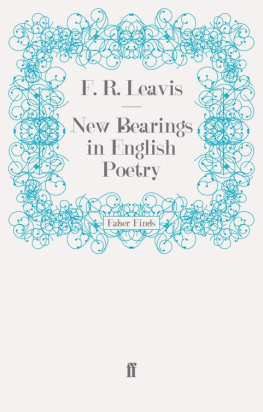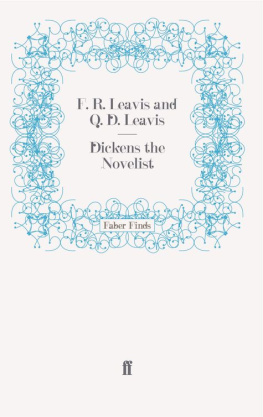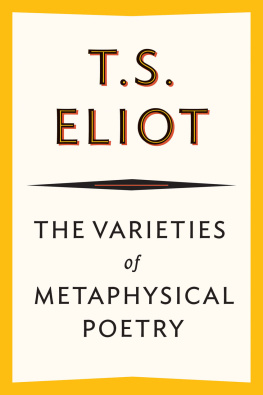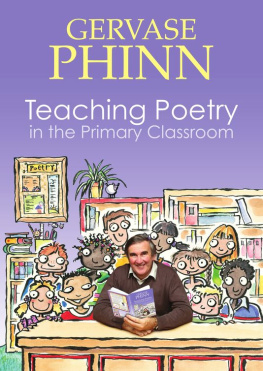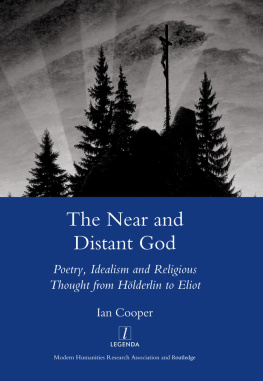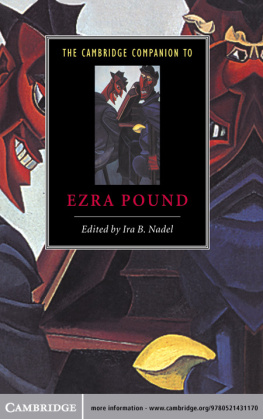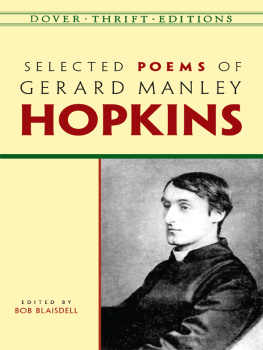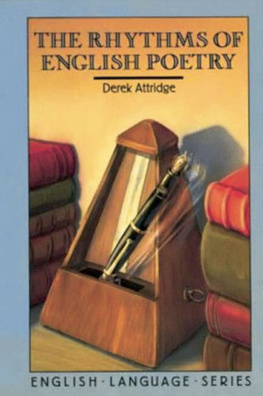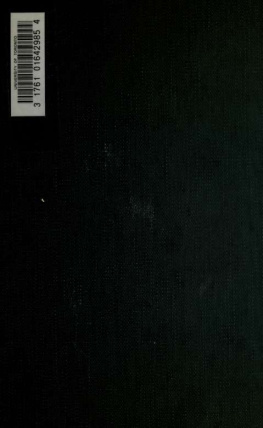
TO H.L. AND Q.D.L.
Nightingales, Anangke, a sunset or the meanest flower
Were formerly the potentialities of poetry,
But now what have they to do with one another
With Dionysus or with me?
* * *
Microscopic anatomy of ephemerides,
Power-house stacks, girder-ribs, provide a crude base;
But man is what he eats, and they are not bred
Flesh of our flesh, being unrelated
Experientially, fused in no emotive furnace.
RONALD BOTTRALL
What we cannot understand, it is very common, and indeed a very natural thing, for us to undervalue; and it may be suspected that some of the merriest witticisms which have been uttered against Mr Wordsworth, have had their origin in the pettishness and dissatisfaction of minds, unaccustomed and unwilling to make, either to others or to themselves, any confession of incapacity.
J. G. LOCKHART
CONTENTS
T HIS book, as the title indicates, does not offer itself as a survey of the verse even the good verse produced in our time. It starts from certain general considerations about poetry and, in particular, the relation of poetry to the modern world. How little I suppose these considerations to be original the book will make plain: it is largely an acknowledgement, vicarious as well as personal, of indebtedness to a certain critic and poet. Indeed they have been commonplaces for some years. They may be found habitually referred to and employed as such in the Calendar, that uniquely intelligent review which, from 1925 to 1927, was, it is hardly excessive to say, the critical consciousness of the younger adult generations. And yet it was not because they were commonplaces that the Calendar, for all its brilliance, was condemned to die of neglect.
If I am embarrassed at all, it is at seeing the simple perhaps even naive way in which I have put them. I have deliberately put them in the simplest terms, believing that so they are most irresistible: for if they are commonplaces they have not, I have ample grounds for contending, been as common in effective acceptance as they should have been.
In any case, my main concern is with the concrete: to discuss critically what seems to me most significant in contemporary poetry, significance being defined by the generalities that I venture upon. I have endeavoured to confine myself as strictly as possible to literary criticism, and to remember that poetry is made of words. Many interesting and apparently relevant questions concerning the present and future of poetry that have presented themselves, and that the reader may expect to find dealt with, I have therefore dismissed, hoping by this asceticism to ensure a cleaner impact.
The reader, missing also certain poets whom he expected to find, may complain that my criterion of significance is too rigorous. To this I can only reply that I meant to it be rigorous: nevertheless, I do not think that I have left out much work that is important by any serious standards. There may, of course, especially in America, be important poets of whom I am ignorant: I hope that American readers will be placated by observing that two out of my three main subjects are Americans by birth.
There are certain serious and intelligent verse-writers whom (though I respect them) I have not dealt with because they seem to me not poets. I preferred to pass them by rather than introduce them only for critical dismissal. The necessary criticism upon them, it seems to me, makes itself if my valuations of Mr Eliot, Mr Pound, and Hopkins are accepted. I notice that in any case the necessities of compression have led sometimes (especially in the second chapter) to effects that might be found ironical.
P OETRY matters little to the modern world. That is, very little of contemporary intelligence concerns itself with poetry. It is true that a very great deal of verse has come from the press in the last twenty years, and the uninterested might take this as proving the existence both of a great deal of interest in poetry and of a great deal of talent. Indeed, anthologists do. They make, modestly, the most extravagant claims on behalf of the age. It is of no use asking a poetical renascence to conform to type, writes Mr J. C. Squire in his Prefatory Note to Selectionsfrom Modern Poets. There are marked differences in the features of all those English poetical movements which have chiefly contributed to the body of our immortal poetry. Should our literary age be remembered by posterity solely as an age during which fifty men had written lyrics of some durability for their truth and beauty, it would not be remembered with contempt. It is in that conviction that I have compiled this anthology. Mr Harold Monro, introducing Twentieth CenturyPoetry, is more modest and more extravagant: Is it a great big period, or a minutely small? Reply who can! Somebody with whom I was talking said: They are all of them only poetical persons not poets. Who will be reading them a century hence? To which I answered: There are so many of them that, a century hence, they may appear a kind of Composite Poet; there may be 500 excellent poems proceeding from 100 poets mostly not so very great, but well worth remembering a century hence.
Such claims are symptoms of the very weakness that they deny: they could have been made only in an age in which there were no serious standards current, no live tradition of poetry, and no public capable of informed and serious interest. No one could be seriously interested in the great bulk of the verse that is culled and offered to us as the fine flower of modern poetry. For the most part it is not so much bad as dead it was never alive. The words that lie there arranged on the page have no roots: the writer himself can never have been more than superficially interested in them. Even such genuine poetry as the anthologies of modern verse do contain is apt, by its kind and quality, to suggest that the present age does not favour the growth of poets. A study of the latter end of The Oxford Bookof Victorian Verse leads to the conclusion that something has been wrong for forty or fifty years at the least.
For it seems unlikely that the number of potential poets born varies as much from age to age as literary history might lead one to suppose. What varies is the use made of talent. And the use each age makes of its crop of talent is determined largely by the preconceptions of the poetical that are current, and the corresponding habits, conventions, and techniques. There are, of course, other very important conditions, social, economic, philosophical, and so on; but my province is that of literary criticism, and I am confining myself as far as possible to those conditions which it rests with the poet and the critic to modify-those which are their immediate concern.
Every age, then, has its preconceptions and assumptions regarding poetry: these are the essentially poetical subjects, these the poetical materials, these the poetical modes. The most influential are apt to be those of which we are least aware. The preconceptions coming down to us from the last century were established in the period of the great Romantics, Wordsworth, Coleridge, Byron, Shelley, and Keats. To attempt to define them is to risk misrepresenting them, for it is largely in their being vague and undefined that their power has lain. Their earliest formulation is to be found, perhaps, in the Dedication (dated 1756) of Joseph Wartons Essay on the Genius and Writingsof Pope. What Warton, consciously challenging the prevailing ideas, puts explicitly, afterwards came to be implicitly assumed.

